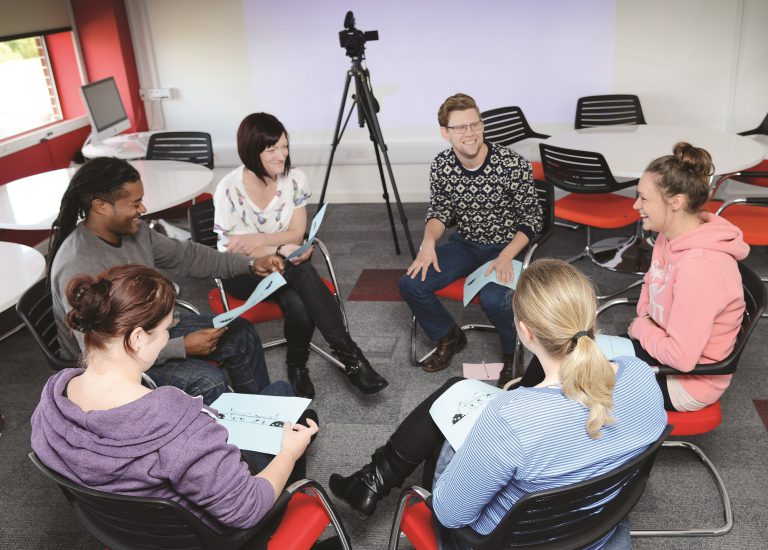
The Humanities are so broad that a degree in this field does not always present the most obvious choice of career. Graduates may worry they lack the ‘solid’ skills developed in subjects like Science, Maths or Engineering, but a degree in the Humanities is still the perfect spur for a long and successful career.
Move over science, humanities’ tech-savvy research is making waves #artsed #STEAM http://t.co/qxJMIdT5Bp
— NAEA (@NAEA) August 13, 2015
Over 60 per cent of the UK’s leaders across a range of professions have humanities, arts or social science degrees, compared to just 15 per cent of leaders in possession of a STEM degree. Graduates of the Humanities are taught to think critically, to draw crucial connections between concepts and not only to accept, but to embrace change; all of these factors come together to form the best employees, and the great leaders of our time.
For employers across the globe, a good qualification in the Humanities is a testament to the student’s hard-graft, enthusiasm, commitment, creativity and ability to process information, and the majority of skills you will pick up along the way will be transferrable to the workplace.
A study by the Association of American Colleges & Universities (AACU) found that while they may not earn as much as professional and pre-professional majors, like Nursing and Business for example, when they are fresh out of school, by the time they are 56-60 years old graduates of the Humanities will earn approximately $66,000, $2,000 a year more than those with professional degrees.
An online survey among employers, conducted on behalf of the AACU, highlighted that employers are focused on innovation and give priority to employees who aid innovative advancement. Overall, 92 per cent of those surveyed agreed that innovation was essential to their company’s success. Furthermore, 95 per cent of employers stated that their company “puts a priority on hiring people with the intellectual and interpersonal skills that will help them contribute to innovation in the workplace.”
‘Humanities research teaches us about the world beyond the classroom, and beyond a job..’ #highered #phdchat http://t.co/gEnqtAxpEN
— Higher Education (@GdnHigherEd) October 19, 2015
In the same survey, 93 per cent of employers agreed that in order to be successful in today’s complex working environment, a candidate’s ability to think critically, communicate clearly and solve complex problems is just as important as their program of study. The good news is that these qualities and skills are exactly what Humanities students can expect to be taught on any high quality degree program.
The knowledge and experience a student can gain from a Humanities degree is excellent preparation for the workplace, and the wide range of skills taught and specialisms covered opens up opportunities in a huge variety of fields and industries. Here are a number of occupations in which talent learned from the Humanities can be translated to a thriving, lifelong career:
Advertising Sales Agent
An Advertising Sales Agent, often referred to as an Advertising Executive, is someone who sells advertising space to businesses and individuals. They form part of a range of industries, including advertising agencies, radio, television and internet publishing. Progression in this field can be fast and extremely rewarding, and depending on their level of experience, an Advertising Sales Agent can receive between US$40,000 and US$60,000 a year.
While high-school qualifications may suffice for some sales positions, most employers prefer candidates who have earned a degree. Anthony Racknoss, a student of Western Sydney University, is working towards his Bachelor of Communication with a Major in Advertising. He feels his time at University has prepared him for a successful career in the industry.
He says: “The advertising is really good…it’s really practical, which I think is great. In my favourite class, which is Ad Creative, all we were doing was making ads…We’re all just actually doing what we would be doing in the industry.”
“The teachers are really good as well. They actually are from the industry and you can look them up and find out what they’ve done… they really know what they’re doing.”
Editor
An Editor’s job is to polish, enhance and refine a text to direct the focus of the story, article or movie along a particular course. Editors are used in many fields; from film, video, magazines and newspapers, to blogs and books, both fiction and non-fiction. You will not finish University and jump straight into an editorial role, but once you have progressed the rungs of your career, there’s the potential to earn between US$60,000 and US$90,000 a year.
Lynette Sheridan Burns is a Professor of Journalism at Western Sydney University. Being the senior academic in the institution’s Journalism Program means she knows exactly what it takes to be successful in this field.
She says: “We teach journalism and digital content, really, because we teach them the ethical framework to work through the social ramifications of what journalists do.
“But we also teach them… to use all these social media platforms… so that they have the skill set that’s required today. But what we really need is for them to have the thinking skills that will allow them to negotiate the environment, that I can’t predict, that will exist in ten years’ time.
“The ideal person to study journalism has an enormous curiosity about the world. They come to us with a desire to go places, to see things, to understand… the ones who are successful are always curious, interested, engaged, will become involved in anything… you have to have a degree of natural enthusiasm and a sense of curiosity about people and different lives, and the way that society works, because in the end, journalism does still reflect society to itself.”
Interpreter
The average salary for a professional interpreter is between US$50,000 and US$90,000 a year, but in order to achieve this, candidates should work for a degree in linguistics.
Dr Jason Shaw is a senior lecturer in Linguistics at Western Sydney University, so he understands the wealth of opportunity this field of study can present. He says: “[Students] become interested in Linguistics, and they go through the rest of the major… unfolding it bit by bit, and when they get into the elective scene, this knowledge of how language works, how that’s applicable in a range of areas that affect your life, that affect everyday interactions, that affect how you understand the world around you.
“The kind of student that linguistics attracts is the kind of student that’s interested in hard questions, in deep questions, and the analytical skills that you use are going to help you… whatever your career path.”
These are just a small snapshot of some of the possibilities open to students. It’s clear that the Humanities are a rewarding area of study, offering a wealth of opportunities in a broad range of specialisms. Students are equipped with the skills and knowledge they need to follow their passions into a long and fruitful career, proving that the Humanities really are the first step to success.
MT @AtheneDonald: A rounded education, science and arts, should be for all. | @commentisfree @guardian http://t.co/2RyTNCJn8R
— The Royal Society (@royalsociety) February 25, 2015
Read on to learn more about some of the world’s leading universities offering high quality Humanities programs, helping to prepare students for successful careers in a wide variety of industries:
SCHOOL OF HUMANITIES AND COMMUNICATION ARTS, WESTERN SYDNEY UNIVERSITY – AUSTRALIA
The School of Humanities and Communications Arts at Western Sydney University is a large School comprising 133 academic and 42 professional staff. School staff are recognised nationally for their teaching excellence through the Australian Governments Awards for University Teaching. The School is highly ranked internationally and makes a substantial contribution to the University’s research performance. The School of Humanities and Communication Arts has a commitment to an academic focus that is contemporary, interdisciplinary, creative and innovative, community oriented and founded upon a set of values that support a society committed to social, cultural, economic and political justice.
We’re ranked among the top two per cent of universities in the world. We believe in a world of #unlimited opportunity.
— Western Sydney Uni (@westernsydneyu) October 13, 2015
FACULTY OF ARTS, UNIVERSITY OF WARWICK – UK
The University of Warwick is a world-leading university with the highest academic and research standards. Its students, alumni and staff are consistently making an impact – the kind that changes lives, whether close to home or on a global scale. The Faculty of Arts at Warwick is one of the world’s top 50 Arts and Humanities faculties, and is home to a number of departments and research centres spanning the Arts subject areas. Research in the arts and humanities has diverse impacts on society, making positive contributions to the health and welfare of individuals, associations, public bodies and businesses.
FACULTY OF ARTS AND SOCIAL SCIENCES, UNIVERSITY OF WAIKATO – NEW ZEALAND
The University of Waikato is committed to delivering a world-class education and research portfolio, providing a full and dynamic university experience, distinctive in character, and pursuing strong international links to advance knowledge. The Faculty of Arts and Social Sciences (FASS) encourages our students to understand that their choice of study is of value to themselves and society; that they will also gain worthwhile skills that can be utilised in the workplace; and that studying for the pleasure of learning and for academic stimulation is as important as studying for vocational purposes.
HUMANITIES DIVISION, UNIVERSITY OF CALIFORNIA SANTA CRUZ – USA
UC Santa Cruz is a public university like no other in California, combining the intimacy of a small, liberal arts college with the depth and rigor of a major research university. What does it mean to be human, to analyse and construct the human experience? These are the fundamental questions that guide and unite the learning, teaching and scholarship conducted in UC Santa Cruz’s Humanities Division. The exploration and discussion of this query has culminated in some of humanity’s most deeply and widely valued beliefs and teachings about ourselves and the world in which we live.
FACULTY OF HUMANITIES, CURTIN UNIVERSITY – AUSTRALIA
Curtin University is Western Australia’s largest and most culturally diverse university with Australia’s third largest international student population. With campuses in Malaysia and Singapore as well as face-to-face teaching in a number of countries, Curtin has a strong commitment to international engagement. The Faculty of Humanities has both a local and global focus, offering degrees that are applied, creative and relevant to contemporary society. It is committed to producing graduates who are career ready and many of our programs are backed by professional accreditation. Some of these programs are also taught in Singapore, Malaysia, Hong Kong, Mauritius and Vietnam.
SCHOOL OF HUMANITIES, UNIVERSITY OF BRISTOL – UK
Bristol is one of the most popular and successful universities in the UK and was ranked within the top 40 universities in the world in the QS World University rankings 2015. The School of Humanities is home to almost 2,000 undergraduate and postgraduate students. The School has been growing over the last few years and your lecturers include many young and exciting scholars from all over the world. The School is also leading the way in the ‘new humanities’ including digital humanities, environmental humanities and medical humanities and four new lecturers have just been appointed to positions in these exciting fields.
The #THEunirankings are out and we’ve gone up five places to 69th in the world: http://t.co/yCPrUqW1xH pic.twitter.com/4LqrtIQ9EA
— Bristol University (@BristolUni) October 1, 2015
Image via University of St Mark & St John.
Certain extracts of this story were initially published on our sister site Asian Correspondent.







